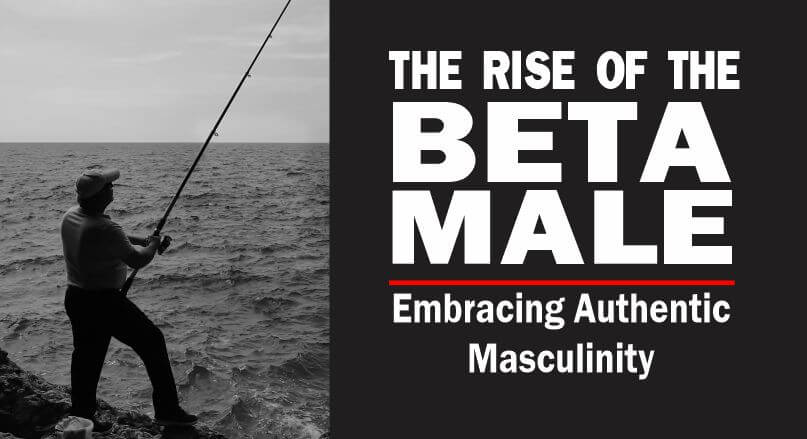Last updated on September 23rd, 2024 at 03:18 pm
This article examines the rise of the beta male in modern society, contrasting it with the traditional alpha male archetype.
We will talk about the unfolding perceptions of masculinity, shaped by cultural shifts, economic factors, and changing gender roles.
By embracing different shades of masculinity, our understanding of male identity expands to include characteristics such as empathy, emotional intelligence, and collaboration.
Table of Contents
- Who is a Beta Male?
- Understanding Beta Males
- Reasons for the Rise of the Beta Male
- Cultural Influences on the Beta Archetype
- Challenges Faced by Beta Males
- Why We Should Recognize and Support Beta Males
- Advantages of Being a Beta Male
- Misconceptions About Beta Males
- The Dark Side of Beta Males
- Beta Male Stereotypes
- Examples of Beta Males in History
- How to Embrace Your Beta Side
- Conclusion
Who is a Beta Male?
The Beta male is a man who does not conform to the traditional ideals of masculinity of being aggressive, assertive, and forceful, instead, he is more submissive, sensitive, and accommodating in their social interactions.
The rise of the beta archetype in modern society marks a shift in the perception of masculinity.
Where traditional masculinity glorifies traits such as aggression, competitiveness, and emotional stoicism, the beta male exudes a gentler, more empathetic approach.
Some men are inherently less likely to exhibit traditional “alpha male” traits, but it’s not a result of weakness or a lack of masculinity.
It ignores the fact that there is a range of masculine behaviors and characteristics and that not everyone has to fit into a narrow or compact mold.
Also, the beta concept often ignores the positive aspects of being sensitive or empathetic.
Studies have found that men who express vulnerability are more likely to have healthy and fulfilling relationships, better emotional intelligence, and stronger mental health.
Related: Negative Signs Of A Beta Male In Relationships
Understanding Beta Males
The Beta archetype has gained traction in modern discussions, presenting a contrasting image to the traditional alpha male archetype.
At its core, this archetype is characterized by a range of traits that distinguish him from more conventional masculine models.
Central to this identity is emotional intelligence, which is the ability to understand and manage his own emotions, as well as the emotions of others.
This skill set facilitates deeper connections and makes him supportive both in personal and professional relationships.
Beta males also have innate empathy which enables them to navigate social interactions with sensitivity and compassion, making them attuned to the needs of those around them.
Rather than resorting to competition, the beta archetype prefers collaboration and partnership, striving to create harmonious relationships. This behavior has made them to be labeled “nice guys.”
Their supportive nature often positions them as reliable allies, whether within the context of friendships, family dynamics, or romantic partnerships.
Reasons for the Rise of the Beta Male

The concept of the beta archetype has gained prominence in recent years, pointing to societal changes that have altered traditional perceptions of masculinity.
Increased Acceptance of Different Expressions of Masculinity
One primary factor contributing to this shift is the increased acceptance of different expressions of masculinity.
Unlike traditional notions that often portray masculinity as synonymous with dominance and aggression, modern society is now embracing a broader spectrum of male identities, allowing individuals to express themselves more authentically.
This evolution encourages men to explore roles that may differ from those traditionally associated with masculinity, thus promoting a more inclusive understanding.
Growing Emphasis on Mental Health of Men
Also, the growing emphasis on mental health and emotional well-being has played a central role in the rise of the beta male.
Society is witnessing a cultural shift towards prioritizing mental health awareness, thereby encouraging men to address their emotional vulnerabilities openly.
This recognition helps dismantle the stigma that has historically suppressed emotional expression among men, allowing them to seek help without fear of judgment.
As a result, more men are embracing traits associated with beta males, such as empathy, sensitivity, and cooperation, which contribute to healthier relationships and self-acceptance.
Prevalent Discussions on Male Identity
The discussions surrounding male identity have also become more prevalent, facilitating open conversations about the diverse experiences of men.
By challenging traditional stereotypes, men are empowered to define their identities on their own terms.
This transformation aligns with a broader societal move towards gender equality, where adhering to rigid roles based on gender is increasingly viewed as toxic.
Consequently, more men are likely to identify with the beta archetype, which favors collaboration and emotional intelligence, rather than competition and dominance.
These cultural shifts contribute to a growing acceptance of beta males, creating a level playing ground where everyone thrives.
Related: Alpha Male Vs Beta Male: Why Compare Men?
Cultural Influences on the Beta Archetype
The identity of the beta male has been notably shaped by various cultural influences, particularly through the prism of media and social dynamics.
In the past, traditional representations of masculinity in films, literature, and television often depicted the archetype of dominant, assertive males, reinforcing a narrow framework of masculinity that marginalized alternative expressions of male identity.
However, contemporary media increasingly celebrates diverse portrayals of masculinity, including the beta male’s role as sensitive, thoughtful, and empathetic.
This shift allows for a broader understanding of what it means to be a man in today’s society.
Many popular television shows and films have introduced characters that exude the beta male traits, showcasing their strengths in emotional intelligence and vulnerability.
As society becomes more attuned to the need for mental health and interpersonal relationships, these representations offer a counter-narrative to the traditional masculine stereotypes.
Such characters illustrate the reality that strength can also be found in gentleness and that leadership can emerge through collaboration rather than dominance.
The Role of Social Media
Also, social media platforms have dramatically transformed societal perceptions of masculinity.
Online spaces allow men to express their feelings openly, share personal experiences, and connect with others who may identify with beta characteristics.
This democratization of identity provides men with the agency to redefine what masculinity means for them, breaking down long-standing stigmas associated with vulnerability.
Influencers and activists promoting mental health awareness have contributed to this dialogue, encouraging men to embrace their authentic selves without the fear of social repercussions.
As a result, the concept of the beta is evolving, influenced by a collective recognition that there is no singular way to be male.
Related: The Enduring Appeal Of Beta Male
Challenges Faced by Beta Males
Beta males often encounter a range of challenges that impact their self-identity and socio-cultural interactions.
One of the most pervasive issues is the stigma associated with being labeled as a beta.
In modern society, traditional masculinity is often celebrated, which puts men who do not fit this archetype at a disadvantage.
The stereotypes that surround this male archetype frequently paint them as weak, submissive, or unable to assert themselves.
These negative perceptions can lead to exclusion or ridicule in social settings, forcing many beta males to navigate harsh judgments that question their masculinity.
Beyond societal stereotypes, beta archetypes may also experience internal struggles concerning their identity.
The pressure to conform to traditional masculine norms can create cognitive dissonance for those who have more passive or nurturing traits.
This conflict can result in feelings of inadequacy, leading to self-doubt and anxiety.
The fear of not living up to societal expectations can further complicate men’s relationships both with themselves and others, as they grapple with aligning their authentic selves with what is perceived as “masculine.”
For some, these pressures may even lead to a rejection of their beta identity, causing them to adopt behavior that feels disingenuous.
Related: 5 Reasons Why Women Love Beta Males As Partners
Related: The Unspoken Struggles Of Beta Archetype
Why We Should Recognize and Support Beta Males
Recognizing beta males can have implications for personal relationships.
In a society where dominance and aggression are perceived as accepted qualities of being a man, men who have beta male characteristics can provide much-needed balance.
They tend to exhibit patience, active listening, and nurturing qualities, which can close the gap in communication and strengthen relational bonds.
Moreover, by valuing these traits, society can move toward more equitable partnerships where all individuals feel empowered to express their emotions authentically.
Professionally, embracing different sheds of masculinity can create more inclusive work environments.
Beta males, who often lead through collaboration rather than competition, contribute to teams that value input from all members, nurturing innovation and creativity.
As organizations work to adapt to changing workplace dynamics, they stand to benefit from a culture that welcomes various leadership styles, ultimately leading to a more harmonious work atmosphere.
Advantages of Being a Beta Male

Of course, there are bright sides to being a beta man which it has to do mostly with mental health and being agreeable with society.
Let’s take a look:
1. Better at Building Relationships: The beta archetype excels in relationship-building due to higher emotional intelligence and empathy. Their self-awareness helps in emotional regulation and expression.
2. Better Listeners: Betas prioritize others, understand perspectives, and respond empathetically. Their openness promotes trust and encourages sharing.
3. Less Likely to Be Aggressive or Violent: They exhibit lower testosterone levels and lesser interest in domination, leading to reduced aggression. Testosterone often links to alpha male assertiveness and dominance.
4. More Likely to Be Supportive: They offer strong support due to their empathy and nurturing nature. They prioritize harmony and well-being, rather than dominance.
Misconceptions About Beta Males
Beta males are often misunderstood and subjected to several misconceptions, which can be harmful and unfair.
Let’s take a look:
1. They are Weak and Passive: One of the most common misconceptions about beta males is that they are weak and passive. This is far from the truth. Beta males may not be as assertive as alpha males, but that does not make them weak.
2. They are not Successful: Another misconception about beta males is that they are not successful. This is also untrue. Many are highly accomplished in their careers and personal lives and can achieve their goals through collaboration and teamwork.
3. They are not Attractive: Betas are often seen as less attractive than alpha males, but this is also a misconception. Many women find betas attractive because of their kind and caring nature, and their ability to listen and communicate effectively.
4. They are not Masculine: There is a misconception that beta archetypes are not masculine. They possess some of the traits of traditional masculinity, such as physical strength, courage, and self-reliance. However, they also possess other traits that are less valued in traditional masculinity, such as empathy, emotional intelligence, and a willingness to collaborate and communicate.
5. They are not Leaders: Another misconception is that they are not leaders. Betas can be highly effective leaders because of their ability to listen to and empathize with others.
The Dark Side of Beta Males
While this category of men has many positive traits that make them valuable members of society, there is also a darker side to this personality type that can manifest in destructive ways.
Here are some examples of the dark side of the beta:
1. Passive-Aggressiveness
Their agreeable nature and their desire to avoid confrontation can lead to a pattern of passive-aggressiveness, where they express their anger or frustration indirectly through sarcasm, backhanded compliments, or other subtle forms of communication, which can damage relationships.
2. Self-Doubt
They often struggle with self-doubt, which can prevent them from taking risks and pursuing their goals.
3. Indecisiveness
Betas may also struggle with making decisions, as they tend to weigh multiple options and consider the opinions of others before coming to a conclusion. This can lead to indecisiveness and a lack of assertiveness, which can be frustrating for those around them.
4. Over-Apologizing
They may be prone to over-apologizing, even when they are not at fault. This can create a dynamic where they are constantly seeking the approval of others and feeling guilty for their own needs and desires.
5. Resentment
They may also be prone to feelings of resentment, particularly towards those whom they perceive as more dominant or successful.
This can lead to feelings of envy and bitterness, which can poison relationships and prevent him from experiencing true happiness and fulfillment.
6. Can Be Taken Advantage Of
They exhibit agreeable and cooperative traits in social interactions which encourage positive relationships. However, these qualities may expose them to exploitation.
7. Can Struggle to Set Boundaries
Beta males may face boundary-setting challenges due to prioritizing others’ needs, fearing guilt or selfishness. Low confidence and self-esteem hinder asserting themselves, fearing rudeness or rejection.
8. Can Experience Self-Esteem Issues
They might experience self-esteem issues due to comparisons with more dominant individuals, feeling inadequate against societal masculinity norms.
Beta Male Stereotypes
1. The Nice Guy
The “Nice Guy” label describes men who expect romantic attention for their kindness, feeling frustrated by rejection.
As a stereotype, they lack the confidence and assertiveness associated with alpha males. Passive and needy traits can be unattractive to women seeking confidence.
The stereotype can reinforce harmful notions about women’s preferences. Healthy relationships rely on respect, communication, and consent, not entitlement based on kindness.
2. The Friend Zone
The friend zone refers to one-sided romantic feelings in a friendship. As a beta archetype, it portrays men as passive, weak, and lacking assertiveness, pursuing romance through friendship.
This idea assumes women prefer dominance. It’s harmful, perpetuating unrealistic expectations and dismissing respectful boundaries and genuine friendships in favor of aggressive pursuit.
3. The Doormat
The doormat refers to a passive, submissive person often associated with beta stereotypes. They prioritize pleasing their partner over asserting needs, leading to perceived weakness.
They struggle to stand up for themselves or express opinions, reinforcing harmful notions that men must always be dominant, suppressing empathy and self-care.
Examples of Beta Males in History
Here are some examples of men who may fit the description of the beta based on their historical personas and social status:

- Albert Einstein: Although he was a brilliant physicist who revolutionized the field of science, Einstein was known for his pacifist beliefs and was often seen as meek and unassuming in his personal life. He was a celebrated introvert who dedicated all his time to looking for something to discover. Portrait by Ferdinand Schmutzer.

- Charles Darwin: Darwin is widely regarded as one of the most respected, influential, and popular scientists in history. He was a very quiet, shy, and introverted person who struggled with anxiety and depression. Despite his exploits, he was not the loud type and always wanted to enjoy his solitude. Photo Credit: Wikipedia.

- Franz Kafka: The author of “The Metamorphosis” and other seminal works of literature was known for his quiet demeanor and introspective personality. He was a Bohemian novelist who spoke German and was a short-story writer who was based in Prague. He is widely regarded as one of the major figures of 20th-century literature. Photo Credit: Wikipedia.

- Vincent van Gogh: The famous painter was often seen as an eccentric outsider during his lifetime and struggled with mental illness. He was Dutch and posthumously became one of the most influential persons in Western Art in history. Photo Credit: Art Institute of Chicago.

- Mahatma Gandhi: The Indian leader and advocate for nonviolent resistance was known for his humility and peaceful approach to activism. He applied nonviolent resistance to lead a successful campaign for India’s independence from the British grip. Photo Credit: Wikipedia.
It’s worth noting that these men may not necessarily fit the negative connotations often associated with the beta. They were all highly accomplished individuals who made significant contributions to their respective fields.
How to Embrace Your Beta Side
1. Embrace Your Empathy
As a beta, you likely have a heightened sense of empathy and emotional intelligence.
Use this to your advantage by developing strong relationships with those around you.
Be a good listener, offer support, and show compassion to those in need.
These traits will help you build strong connections with others and earn their respect.
2. Be Confident in Your Abilities
Just because you’re not an alpha male doesn’t mean you’re not capable of achieving great things.
Believe in your abilities, and don’t let anyone tell you otherwise or make you feel you are less of a man.
Remember that confidence comes from within, and it’s important to cultivate a sense of self-worth that isn’t dependent on external validation.
3. Speak Your Mind
While betas may be less confrontational than their alpha counterparts, that doesn’t mean they should stay silent.
Speak your mind and share your thoughts and opinions, even if they differ from those around you.
Remember that diversity of thought is valuable, and your unique perspective can add a lot to any conversation.
4. Find Your Tribe
Finally, it’s important to find a community of people who appreciate and value you for who you are.
Seek out like-minded individuals who share your values and interests, and surround yourself with people who lift you up and support you.
Having a strong support system can make all the difference when it comes to embracing your personality as a beta.
Frequently Asked Questions
What is a beta male?
He is a man who exhibits personality traits that are traditionally associated with submissiveness, shyness, or lack of assertiveness.
Is being a beta male a bad thing?
No, being a beta male is not inherently a bad thing. It is simply a different expression of masculinity than what is traditionally considered “alpha” or dominant.
Can beta males be successful?
Yes, they can be successful in many different areas of life, including relationships, careers, and personal growth.
Is the concept of beta males harmful?
The concept of beta males can be harmful if it reinforces harmful stereotypes or pressures men to conform to narrow definitions of masculinity. However, it can also be a useful way to describe certain personality traits and behaviors.
Can beta males be assertive?
Yes, they can be assertive when necessary. Assertiveness is a skill that can be learned and practiced, regardless of one’s personality type.
How can society support beta males?
Society can support beta males by promoting a more inclusive and equitable definition of masculinity that values individuals for their unique qualities and contributions, rather than their conformity to narrow definitions of gender roles.
Conclusion
The beta male concept describes men with traits linked to submissiveness and lack of assertiveness. Masculinity is diverse, and self-expression should be authentic.
Embracing the beta male label can be empowering. Introversion and non-aggression don’t imply weakness; they can be assets in collaboration and relationships.
You’re not alone; successful men share these traits. Seek role models and peers for support and community, embracing your unique qualities and perspectives.
REFERENCES
- Move Over, Alpha Males. Why Being a Beta May Be Better
- 20 Virtues and Flaws of a Beta Male
- https://www.beverlyhillsmagazine.com/6-things-to-know-about-being-a-beta-male/
- https://fastercapital.com/keyword/beta-males.html
- https://www.senseorient.com/beta-male/
- https://fastercapital.com/topics/embracing-your-beta-male-identity.html
- https://sites.psu.edu/pennstatercl/the-rise-of-the-beta-male/
Pyo Merez (PsyD) is a distinguished adolescent and adult psychologist at the forefront of mental health advocacy.
With expertise in cognitive and developmental psychology, focusing on social relationships, cultural contexts, and individual differences, Pyo has dedicated his career to empowering adolescents and adults.
As a sought-after speaker and panelist, Pyo shares invaluable insights on issues affecting young people, contributing to a deeper understanding of mental health and well-being in today's society.


